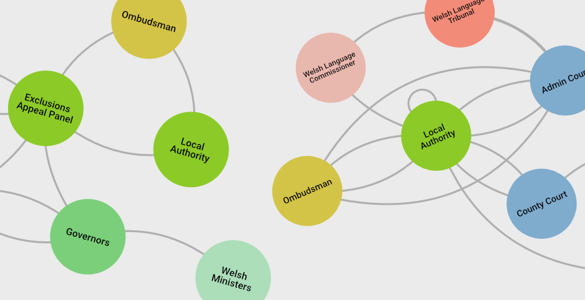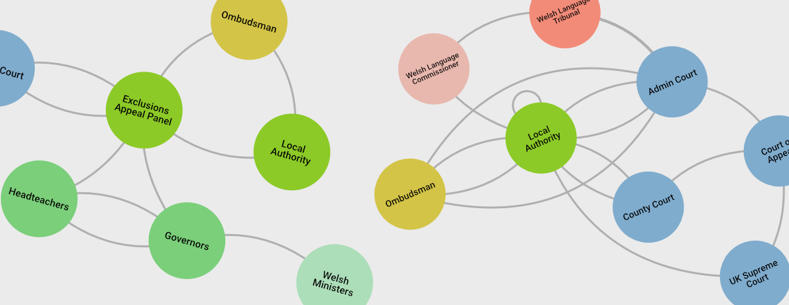This week the Commission on Justice in Wales will publish its report. The Commission was set up by the Welsh Government to review the operation of the Welsh justice system and set a long-term vision for its future.
One area on which the Commission has received significant evidence is administrative justice. However, as Former Legal Editor of The Times Francis Gibb once wrote, administrative justice is often “unseen, ignored and unloved”; it is the “Cinderella branch of the justice system” dealing with more cases than any other yet operating largely in the shadows.
In their constituency work, Assembly Members are often at the frontline of administrative justice, perhaps without realising it. This post explains what administrative justice is and why it matters in Wales.
What is administrative justice?
According to the UK Administrative Justice Institute, administrative justice concerns “how we interact as individuals when the government, or those working on its behalf, act in ways that appear wrong, unfair or unjust”.
Administrative justice includes decisions about people’s social rights and entitlements, from those taken by the First Minister, to those made by individual employees in local authority departments. The main subjects of decision-making include things like housing, healthcare, education, planning and the Welsh language.
In devolved areas, the Assembly and Welsh Government are responsible for making a lot of the law that applies to Welsh public bodies, and for ensuring that people can seek justice if public bodies break the law or provide poor services. Although there are general principles of fairness and reasonableness that come from England and Wales judge-made law, many administrative decisions taken at an individual level involve applying legislation, regulations and guidance, made in Wales, or for Wales. An exception is law and redress in non-devolved social security, one of the largest areas of administrative justice affecting people in Wales.
The Law Commission suggests that administrative justice systems have four central pillars: internal mechanisms for redress within public bodies (internal reviews), tribunals, ombudsmen, and courts. A closer look at each of these pillars is given below.
Internal Review
The starting point for administrative justice is actually trying to ensure that public bodies make decisions that are ‘right first time’ and Welsh law has an important role to play here. But if someone is dissatisfied, their usual first means of redress in the administrative justice system is to ask for an internal review (sometimes known as a reconsideration).
In Wales, internal mechanisms for public bodies to review their own decisions are variable. Just one example is in social housing and homelessness law, where there are at least five different pieces of law governing how local authorities, and in some cases housing associations, should review their decisions if requested to do so by someone affected.
It would be open to the Assembly and Welsh Ministers to rationalise some of these procedures to improve consistency and accessibility. This could be done as part of a proposed programme of codification under the Legislation (Wales) Act 2019. The Law Commission for England and Wales is also planning to look into the consistency and fairness of internal review procedures.
Tribunals and Courts
In most cases if a person is dissatisfied with the result of an internal review, they can appeal to a court or tribunal. The Welsh Government has responsibility for devolved tribunals. These are judicial bodies, which can decide disputed issues of fact and law, and include the Special Educational Needs Tribunal for Wales, Mental Health Review Tribunal for Wales and Residential Property Tribunal for Wales.
Devolved tribunals are administered by a Welsh Government department, the Welsh Tribunals Unit (WTU). Steps have been taken, including in the Wales Act 2017, to increase the independence and professionalism of the developing Welsh tribunals service administered by the WTU, such as establishing a President of Welsh Tribunals. For some, these tribunals can be seen as the first step towards operating a more extensive devolved Welsh justice system.
However, Assembly legislation has not yet made extensive use of the devolved tribunals as a means to enable people to enforce their rights. Where the Assembly has imposed new legal duties on public-bodies, it has often chosen to provide a right of appeal to the non-devolved courts as a means of enforcement. In other cases, the Assembly has not included specific appeal rights in new legislation at all. It has instead proposed that other means of redress, such as a complaint to a Commissioner or judicial review in the Administrative Court, are sufficient. Limited resources and expertise within Welsh tribunals have been cited as reasons for not giving them additional roles that would substantially increase their caseloads.
As evidence to the Commission on Justice in Wales demonstrates, access to a court, and particularly judicial review in the Administrative Court, is costly. Legal aid reforms have had a disproportionately negative impact in Wales compared to England. Approximately a third of Welsh claimants in judicial review cases, challenging the lawfulness of government and administrative action, do not have legal representation. Those who are represented are more likely to be represented by lawyers based in England than by lawyers based in Wales.
Court action is often not an ideal means to redress individual people’s grievances; because this can be expensive, time-consuming and complex, and may not actually give them the remedy they would prefer. On the other hand, judicial review (when accessible) can play an important role in providing an independent and transparent judicial interpretation of Welsh law.
The Ombudsman and Commissioners
Where a person has been treated unfairly or received a poor service but has no right of redress to a court or tribunal, the Public Services Ombudsman for Wales (PSOW) may be able to investigate the matter. New Assembly legislation gives the PSOW powers to investigate possible instances of systematic maladministration without the need for an individual complaint. The new law provides a more flexible approach to how complaints can be received and gives the PSOW a role in setting standards for complaints handling.
Welsh Commissioners also have responsibility for improving the quality of public body decision-making in areas such as children’s rights, the rights of older people, and the right to sustainable development. Although the Commissioners are a progressive development towards rights-respecting public services, each is underpinned by different law and has different powers, causing confusion among advice providers and the general public. Some Commissioners can investigate individual complaints of rights breaches in public service delivery, but how they exercise this power varies. Others have no individual complaints jurisdiction.
For example, the Welsh Language Commissioner has regulatory powers, and the ability to issue legally binding penalties to public bodies that fail to comply with Welsh Language Standards. The Future Generations Commissioner on the other hand reports on public body compliance with well-being objectives.
However, the view found by three High Court judges (Lambert J, Black J and Garnham J) in two cases to date is that duties created under the Future Generations (Wales) Act 2015 are not enforceable through judicial review in the courts. A recent example is the permission hearing in the High Court on the closure of a school in Neath Port Talbot. It should be noted that this view is subject to on-going legal debate and may be subject to further legal hearings.
What does this tell us about administrative justice in Wales?
Administrative justice is a broad topic, many redress mechanisms have developed ‘ad hoc’. Things could be done differently and better in Wales by taking a more joined-up approach. A starting point could be the current First Minister’s view that good administration is “the first principle of social justice” in devolved Wales.
Administrative justice and social justice are not exactly the same thing. Administrative decision-makers and redress providers don’t set policies about the distribution of wealth, social resources and opportunities, but they do make every-day decisions about what these policies entitle people to. The administrative justice system is central to ensuring that these decisions are lawful and fair, and that Assembly legislation is complied with in practice.
Who is responsible for administrative justice in Wales?
Responsibility for administrative justice is spread across various Assembly Committees and Government departments. An independent non-statutory oversight Committee for Administrative Justice and Tribunals in Wales (CAJTW) operated until 2016 but has not been replaced.
Although individual improvements have been made, including to the independence of Welsh tribunals and expanding the PSOW’s jurisdiction, the broader idea of administrative justice has generally been unseen and unloved in the wider debate over devolution of justice to Wales.
The Commission on Justice in Wales has examined administrative justice. It will then be the subject of Assembly debate as to how any relevant recommendations should be taken forward.
Article by Dr Sarah Nason, Bangor University
The blog article has been written by Dr Sarah Nason from Bangor University under Senedd Research’s Academic Fellowship Scheme.
Senedd Research acknowledges the support of Bangor University that enabled Dr Nason to take part in this fellowship.
Dr Nason’s broader ongoing research into administrative justice in Wales is funded by the Nuffield Foundation, but the views expressed are those of the author and not necessarily the Foundation. Visit www.nuffieldfoundation.org.






